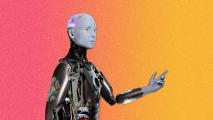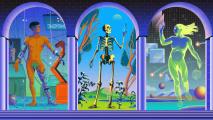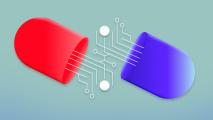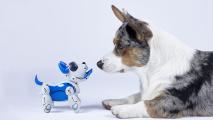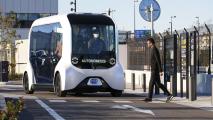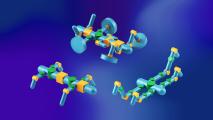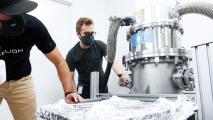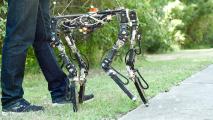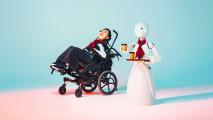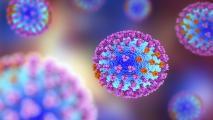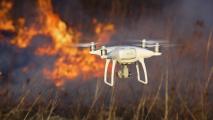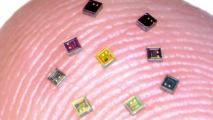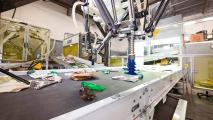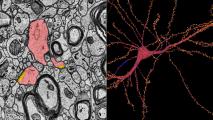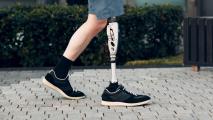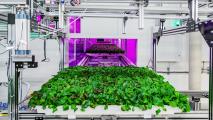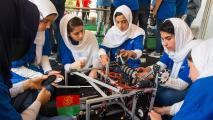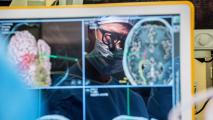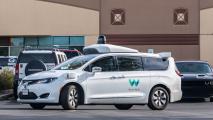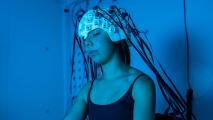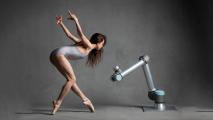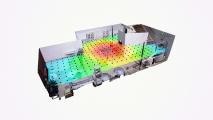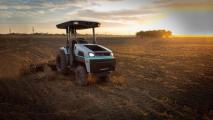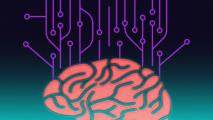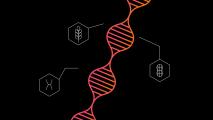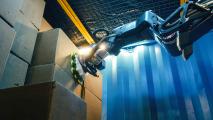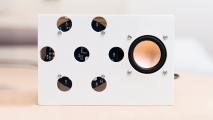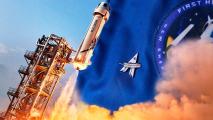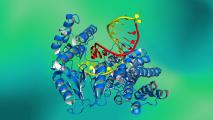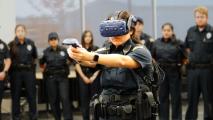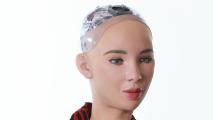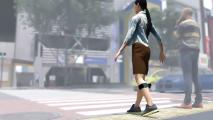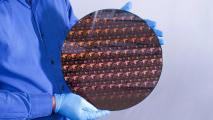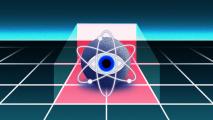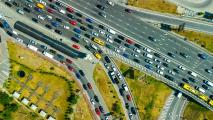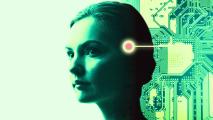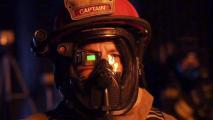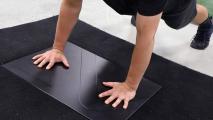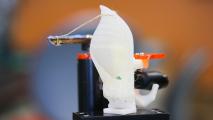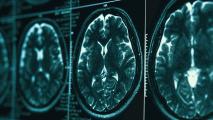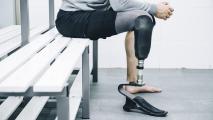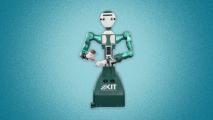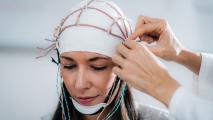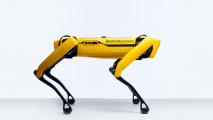Showing 687 results
AI navigation system teaches itself to steer internet balloons
Loon is using a new AI navigation system trained via reinforcement learning to control its fleet of internet-beaming balloons in Kenya.
Humanoid robots are waking up — and they look eerily real
Engineered Arts, a robotics firm located in the United Kingdom, released a video showing a humanoid robot that looks exceptionally lifelike.
Transhumanism: Savior of humanity or false prophecy?
While many of the technologies upon which transhumanists base their dream are real and world-changing, they have major limitations.
AI can find endangered elephants from space
A breakthrough technology uses artificial intelligence to track large animals from space, even in complex terrain.
This high schooler created a drug discovery search engine
While looking for drugs to potentially fight Alzheimer’s, a high school researcher's AI did “comically” bad, until he thought of it as a search engine.
First neuron-level map of a monkey brain revealed
The first neuron-level 3D image of an entire macaque monkey brain could have a major impact on the world of neuroscience.
NFL hopefuls train with sensor-free athlete tracking tech
Intel’s new athlete tracking platform, 3DAT, can deliver performance insights without the use of potentially cumbersome sensors.
Chinese canon employees must pass an AI smile test to go to work
Canon Information Technology's Beijing branch has launched a new type of employee monitoring — smile recognition technology.
Meet MIT’s Kate Darling: Why we should rethink our relationship with robots
According to MIT's Kate Darling, robots are more like animals, not humans.
Toyota’s autonomous shuttle is optimized for Olympians
Tokyo Olympians are riding around the Olympic Village in Toyota’s e-Palette, an autonomous shuttle designed with their needs in mind.
Human battles AI fighter jet in first man vs. machine test flight
Daniel Robinson, a veteran F-22 pilot, flew a real aircraft and battled an AI virtual fighter in a world's first.
Series|
Just Might Work
Meet the woman who can smell diseases like cancer and Parkinson’s
This woman can smell diseases — and she’s working with scientists to give you her superpower.
MIT built an AI to design robots
MIT has developed an AI capable of robot design — all you need to do is tell RoboGrammar the bot’s goal and the available body parts.
Nuclear fusion would change the world. Has its time arrived?
Energy startup Helion claims it will generate electricity from a nuclear fusion device by 2024 — a milestone that could transform the world.
Deep learning vs. machine learning: Explained
Deep learning vs. machine learning AI: what’s the difference?
Quadruped robot can break a leg and keep going
Dyret is a shape-shifting quadruped robot that can change the length of its legs. This helps it walk across different terrains or account for any injuries.
Robot café hires people with disabilities to operate robo-waiters
At the Dawn Avatar Robot Café in Tokyo, diners are served by robotic avatars controlled remotely by people with disabilities.
MIT's AI predicts new strains of HIV, coronavirus
As coronavirus mutations pop up around the world, researchers at MIT are using language-recognizing AI to try and predict what could be next.
New Google tool lets you experience synesthesia
Google’s new online tool lets you experience synesthesia like the abstract artist Vasily Kandinsky, who could hear colors and see sounds.
Virtual patients help doctors improve bedside manner
The Virti platform lets doctors and med students interact with computer-generated virtual patients so they can improve their bedside manner.
AI uses sound waves to read the minds of monkeys
Functional ultrasound tech can be used to map the brain activity of monkeys, suggesting it might be useful for future brain-machine interfaces.
New search and rescue drone listens for human screams
To help first responders find people during disasters, researchers are training a search and rescue drone to listen for human screams.
Is the US military testing an anti-aging pill?
The U.S. military is developing an anti-aging pill that is designed to inhibit performance reduction that comes with aging.
Implantable “neurograins” may be the key to mind-controlled tech
A new kind of brain-computer interface uses tiny neural implants called “neurograins” to record brain activity in rats.
Harvard astrophysicist will lead hunt for alien technology
Harvard astrophysicist Avi Loeb’s new Galileo Project will hunt for alien technology using proven scientific methods and equipment.
New intelligent material could become a “quantum brain”
Scientists created an intelligent material that acts as a brain by physically changing when it learns. This is an important step toward achieving a "quantum brain.”
The case for techno-optimism: Is the world about to enter an era of mass flourishing?
Historically, periods of mass flourishing are underpinned by technological revolutions. Currently, we are undergoing a technological revolution unlike anything the world has ever seen.
Cough-analyzing AI detects asymptomatic COVID-19 infections
MIT has developed an AI that can detect asymptomatic COVID-19 infections from the sound of a person’s forced-cough with incredible accuracy.
Using machine learning to detect dementia in older drivers
Researchers build AI to predict dementia and mild cognitive impairment in older drivers based on driving data.
Recycling robot keeps waste out of landfills
AMP Robotics has developed a recycling robot that uses AI to sort recyclables twice as quickly as humans can.
Autonomous trucks are taking to the highways
Self-driving cars get all the love, but autonomous trucks are already hitting the road, with a “driver-out” demonstration scheduled for 2021.
Google and Harvard have created the most detailed brain map yet
Google and Harvard have released the most detailed map yet, called a connectome, of a section of the human brain.
New optical sensor imitates the human eye
Researchers have created an optical sensor, designed to mimic the human eye. The team says this is a major breakthrough in neuromorphic computing
Tiny magnetic beads and turkeys may lead to better prosthetic limbs
MIT and Brown researchers have developed a technique using implanted magnetic beads that they hope will lead to better control of prosthetic limbs.
If you train robots like dogs, they learn faster
The dog-inspired SPOT framework effectively trains an AI robot more quickly than other reinforcement learning methods.
Innovative vertical farming companies to watch
Here are five vertical farming companies to keep an eye on — and a bonus nine that are selling food you can buy right now.
Open source intelligence exposes war as never before
In a new era of open source intelligence, Russia’s invasion of Ukraine can be studied by anyone with the desire to find, and analyze, data available to all.
Minecraft’s urban planning AI could help design future cities
AIs design entire settlements in an annual Minecraft competition that could reveal uses for the tech in real-world urban planning.
The plea to save the Afghan girls robotics team from the Taliban
A human rights lawyer is trying to get the Afghan girls robotics team evacuated to Canada so its members can avoid living under Taliban rule.
MIT has created an inflatable prosthetic hand
MIT researchers have created a soft, inflatable prosthetic hand that provides advanced abilities at a fraction of the cost and weight.
Neuroprosthesis lets paralyzed man “speak” whole words again
An experimental neuroprosthesis that translates brain activity into words on a computer screen has given a paralyzed man back his “voice.”
Self-driving cars could transform the world in unexpected ways
Self-driving cars could impact the future of economics, equity, privacy, and city planning.
Futuristic city will be a testbed for robots & autonomous cars
Toyota has broken ground on Woven City, a futuristic city prototype where the technologies of tomorrow can be tested en masse.
Space junk created the world’s largest dump. Here’s how we can fix it.
From "laser brooms" to massive nets, space organizations have proposed many ways to clean up the mess of space debris.
In a hole in Earth’s magnetic field, neuroscientists are peering into the human brain
By using quantum physics to measure magnetic fields, researchers are pushing closer to measuring the brain in ways we couldn't before.
Ballerina teaches robot to dance with her during pandemic
“Quantum ballerina” Merritt Moore choreographed duets during lockdown — and then programmed a dancing robot to perform them with her.
Tom Cruise deepfake is the work of a pro VFX artist
The Tom Cruise deepfake featured in a series of TikToks that went viral was created by a professional VFX artist.
Just how are deepfakes made, anyway?
Capable of creating incredibly realistic false data — most infamously of famous people — deepfakes are a powerful tool.
Training a home robot to see — and hear
Facebook's AI lab has released new tools for its embodied AI training platform, including one to train a home robot to respond to sounds.
A virus invisibility cloak makes AAV gene therapy safer
Researchers have figured out a way to cloak the AVV so it can sneak past the human immune system and deliver its gene therapy payload undetected.
The world’s first fully electric, self-driving tractor
Monarch Tractor’s all-electric, self-driving tractor could save farmers money, while also benefiting the environment.
Series|
Hard Reset
How mirrors could power the planet… and prevent wars
If adopted globally, concentrated solar power could make major waves in manufacturing, not to mention prevent wars over oil and mitigate climate change.
Brain mapping: Explained
The brain is a difficult place to work. How can brain mapping help open the black box between your ears?
An IBM quantum computer is being built at a US hospital
An IBM quantum computer is being installed at the Cleveland Clinic as part of the organizations' Discovery Accelerator collaboration.
This company wants to use CRISPR to fix your celiac disease
Sufferers of celiac end up with some pretty lack-luster pastries. A startup thinks CRISPR can help.
Boston Dynamics unveils a new robot: Stretch
Boston Dynamics’ second commercial offering is a warehouse robot named Stretch that can lift and move 800, 50-pound boxes every hour.
Ai discovers billions of new trees from space
Researchers are using artificial intelligence and a supercomputer to count all the trees on the planet, via imaging from space.
New AI turns a smart speaker into a heart rhythm monitor
University of Washington researchers have transformed a smart speaker into a contactless heart rhythm monitor.
Science fiction doesn’t predict the future. It inspires it.
Jeff Bezos’ love of Star Trek inspired him to go to space. Here are a few other innovators to draw inspiration from science fiction.
Longtermism’s perspective on humanity’s past, present, and future
If we manage to avoid a large catastrophe, we can see ourselves as living at the early beginnings of human history.
Google built a neural network to warn ships of whales. will it help?
Google introduced an artificial neural network that can locate whales in the ocean. They want to use it to keep the animals safe from ships.
What happens when an astrophysicist puts ChatGPT to the test?
Can an astrophysicist get ChatGPT to learn and assimilate new information and give correct answers where it gave confident but false ones?
End-of-life AI
End-of-life and palliative care discussions with patients are crucial but difficult. Can AI help?
New AI tool checks up on ocean health from space
Researchers have developed a machine-learning platform that can rapidly process ocean color from satellite images — giving data on ocean health.
Finally! A smart toilet offers fecal testing for the masses
Fecal testing can reveal a surprising amount of medical data. Israeli startup OutSense wants to do so from your home.
DeepMind AI cracks the code of protein structures
A protein’s structure is crucial to its function. Predicting how a protein will fold was a challenge decades in the making — and answered by DeepMind.
Should we be using AI models for diagnosing COVID-19?
Researchers are training algorithms to help predict the severity of COVID-19. But is AI ready for COVID-19?
Predator drones are using AI to create faster fire maps
The National Guard has used drones to create forest fire maps since 2017. New AI upgrades could make the maps in minutes, not hours.
Controversial police killings are being recreated in VR
Virtual reality simulations of controversial police killings of Black Americans are being included in a police training program.
Sophia the Robot joins NFT frenzy
Sophia the robot has created digital art that will be linked to an NFT and sold — making her the latest to join the art world’s current craze.
Nerve-stimulator helps people walk after MS and strokes
The EvoWalk wearable uses electrical stimulation, sensors, and AI to combat foot drop, a condition commonly linked to MS and strokes.
Bringing lost languages back to life with AI
An algorithm that can identify the closest living relatives of lost languages could help linguists unlock the meaning of ancient texts.
Ex-Walmart employee aims to solve America’s food waste problem with AI
In partnership with Ford
Food waste makes up nearly a quarter of landfill material. A new startup aims to change that by automating the process of trucking produce with artificial intelligence.
Smart farm equipment can spot weeds among crops
Facebook’s facial recognition AI will turn ordinary farm equipment into precision agriculture machines by training it to spot the weeds among the crops.
IBM's faster, more powerful microchips
IBM has unveiled the world’s first 2-nanometer microchips, a breakthrough in chip technology that could lead to faster devices that require less energy.
Physicists are starting to harness the power of deepfakes
Generative adversarial networks are the scary AI producing deepfakes. But they have other uses too, and physicists are starting to harness their power.
The CEO of Axon on building safer weapons
In partnership with Axon
After a tragic loss, Rick Smith wanted to find a way to help end gun violence, and in 1993 he brought the TASER device to the market. 30 years later, he believes they’re closer than ever to “making the bullet obsolete...”
Google’s Tree Canopy Lab is helping LA cool down
Google’s new Tree Canopy Lab uses AI and aerial photography to combat the urban heat island effect by showing a city exactly where it could use more trees.
The most impressive language generator yet
OpenAI’s GPT-3 is currently the talk of Twitter. The powerful language generator is writing everything from sci-fi to code.
Desiging a better condom
Around the world, new materials and approaches are being studied as researchers look to create the condom 2.0.
At-home breast cancer screening, powered by AI
An award-winning at-home breast cancer screening device, called the Blue Box, could one day replace uncomfortable mammograms.
Traffic: This 100-year failure is getting a solution
In partnership with Ford
These smart traffic lights are making transportation safer and more sustainable than ever before.
Can CRISPR engineer immunity to avian flu in chickens?
An outbreak of avian flu in chickens can mean millions of birds dead and billions of dollars lost. This startup wants to engineer flu-resistant poultry.
How to radically biohack your mind
Brain-computer interfaces could enable humans to "merge with AI."
AI that predicts pregnancy complication could save lives
By predicting future preeclampsia risk, the AI might save the lives of mothers and their babies.
Heads up display lets firefighters see through smoke
Qwake Technologies’ C-Thru is a heads up display that combines AI, augmented reality, and thermal imaging to help firefighters battle blazes.
AI force plate prevents injuries by predicting them
Sparta Science has developed an AI-powered force plate system that prevents injuries among athletes and soldiers by predicting their likelihood.
Bat-inspired sound location tech could allow drones to fly solo
Inspired by bat’s ears, researchers at Virginia Tech have created a device capable of pinpointing sound location more accurately than other tech — or our ears.
Can humans figure out how deep learning AI thinks?
Deep learning AI is becoming more complex, capable, and impenetrable, but these scientists are attempting to break the black box.
AI beats neurologists at making Alzheimer's diagnosis
Scientists have created an AI capable of making an Alzheimer’s diagnosis that’s more accurate than the one delivered by a group of neurologists.
"Moral Machine" picks up on human ethics
By feeding an AI a diet of books, news articles, and religious texts, researchers were able to create a “moral machine” reflecting the ethics of a society.
Smart home devices can now track your health
Smart home technology can provide insight into residents' health by monitoring temperature, vision, and body chemistry.
Prosthetic leg uses AI to adjust to different terrains
A new computer vision system developed to work with a prosthetic leg predicts the type of terrain ahead so that the limb can adjust accordingly.
This AI robot could become your favorite coworker
European researchers have developed an AI robot to safely work alongside humans, anticipating their needs and providing a strong pair of extra hands.
Can AI predict which depression treatment is most effective?
Artificial intelligence-powered algorithms that analyze brain scans are showing promise in helping doctors find an effective depression treatment on the first try.
NASA scientists want to send this robot dog to Mars
A modified version of Boston Dynamics' robot dog Spot could be the ideal Mars rover for exploring caves and other underground structures.
One robot was able to watch another bot and predict its actions
A Columbia University study suggests that empathy between robots may be possible — and the skill could make the bots more useful to humans.
The metaverse is coming. Cathy Hackl explains why we should care.
We're about to enter the metaverse. This will completely change how we interact with our environment, says Futurist Cathy Hackl.
Meet the Mayflower, the robot boat crossing the Atlantic in 2021
The new Mayflower, set to traverse the Atlantic in 2021, won’t bear any pilgrims. It’s a robot boat, sailing sailor-free.
Man's double hand & face transplant may be first to succeed
Five months post-surgery, a double hand and face transplant recipient shows no signs of transplant rejection, suggesting the procedure was a success.

